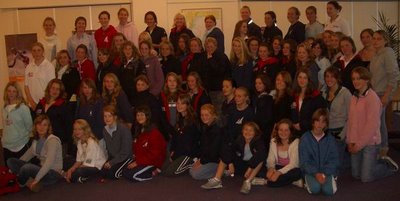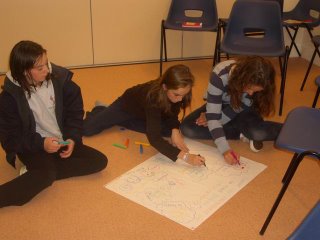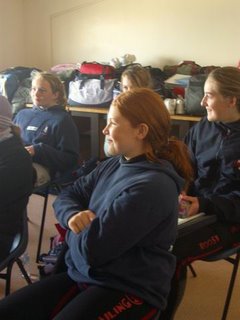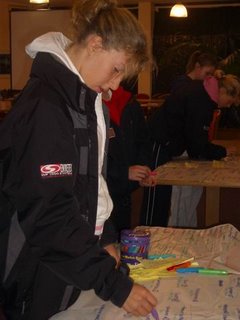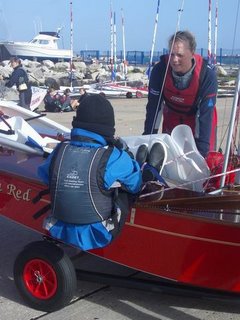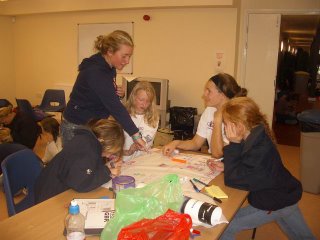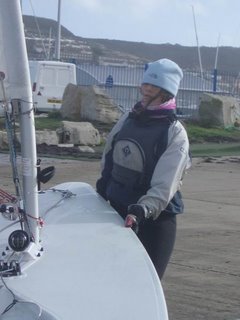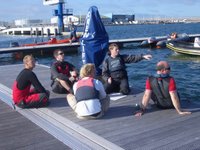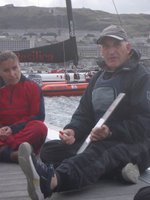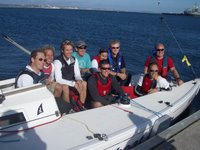I’ve been dog-sitting for friends for the past 10 days, and have had an insight into the world of pet-keeping that I’ve never experienced before. I know ‘Pepper’ well, as I regularly walk her. She’s a beautiful 11 year old Dobermann, and soft and friendly with it.
Looking after a dog 24/7 is an insight into another world – the world of pack animals. I learnt a lot about establishing boundaries and seniority – especially when Pepper started to chew my slippers!
I also made discoveries about saying what I mean. Calling the dog to ‘Come here’ is a high pitched voice which tilts up at the end of the sentence while wondering if she will come back just does not work. Alignment of thinking, body stance and voice (range, timbre and expression) to put clear and assertive messages across worked far better.
I had been steered towards these discoveries by a friend talking about a place in Yorkshire where you can practice assertion through working with border collies as they herd sheep and other animals www.bordercollies.co.uk . Now I fully understand how this can happen.
Mind you, for Pepper, chasing rabbits and deer still take precedence over any mere mortal wanting to go home.
Sunday, February 25, 2007
Wednesday, February 14, 2007
Media changes
I am a member of the RYA’s Paralympic Steering group, which decides policy and selection for the British Paralympic sailing effort. Recently one of us attended an update on 2012 www.london2012.org for our group and he reported back on a presentation from the BBC.
A very effective presentation (to be expected!) pointed out that the techniques for reporting on sport in 1948 (the last time London hosted the Olympics) and Sydney 2000 were essentially the same. Then there was more change between 2000 and 2004 than the previous 52 years. And the speed of technological advancement continues to heat up, to the point that every minute of sport in Beijing 2008 www.en.beijing2008.cn will be available somewhere (traditional media, websites, blogs) to anyone who can find it.
I am reminded to be grateful that I pay my license fee for the BBC www.bbc.co.uk since the freedom this gives them to stay at the forefront of such changes means 2012 will be great viewing, and will probably set new standards for sports reporting in the world.
In the meantime, one of the sailing magazines, Yachting World www.yachting-world.com is filling a gaping gap in sailing media with their Editorial blogs and podcasts. The international sailing community adopted internet communication very early on, and we have excellent ‘newspapers’ such as the Daily Sail and newsletters such as Scuttlebutt as well as websites galore, but the use of new media by Andrew Bray, David Glen, Elaine Bunting and Matthew Sheahan add comment and opinions more along the lines of the serious traditional paper newssheets such as the Guardian, the Times etc. I applaud the initiative.
A very effective presentation (to be expected!) pointed out that the techniques for reporting on sport in 1948 (the last time London hosted the Olympics) and Sydney 2000 were essentially the same. Then there was more change between 2000 and 2004 than the previous 52 years. And the speed of technological advancement continues to heat up, to the point that every minute of sport in Beijing 2008 www.en.beijing2008.cn will be available somewhere (traditional media, websites, blogs) to anyone who can find it.
I am reminded to be grateful that I pay my license fee for the BBC www.bbc.co.uk since the freedom this gives them to stay at the forefront of such changes means 2012 will be great viewing, and will probably set new standards for sports reporting in the world.
In the meantime, one of the sailing magazines, Yachting World www.yachting-world.com is filling a gaping gap in sailing media with their Editorial blogs and podcasts. The international sailing community adopted internet communication very early on, and we have excellent ‘newspapers’ such as the Daily Sail and newsletters such as Scuttlebutt as well as websites galore, but the use of new media by Andrew Bray, David Glen, Elaine Bunting and Matthew Sheahan add comment and opinions more along the lines of the serious traditional paper newssheets such as the Guardian, the Times etc. I applaud the initiative.
Saturday, February 03, 2007
Coaching the 1st 100 days of a new job
I find the work I do for Berkshire Consultancy www.berkshire.co.uk fulfilling. I coach newly recruited high-flying executives through the first 100 days of their new job.
That first half year in a new company is often frantic – you have been employed to make a real difference, you are learning on your feet and the demands on your time and judgement just keeps coming at you relentlessly. Yet it’s a competitive environment – you don’t yet know who’s word to trust, and you dare not show a weakness. At the same time, your personal life may be suffering from the long hours you are putting into work, and if a relocation is necessary too, the going gets really tough.
I’m finding that top managers value a coach to get them through this time. I help them decide priorities, and act as a bouncing board to work through ideas and responses to challenges presented as they occur. My clients find they come out of the first six months with a clearer idea of where they are going, without having alienated people (colleagues and staff) unnecessarily, and with private needs acknowledged. In addition, the portfolio of initiatives they have generated is better balanced by having created time for reflection when under pressure to prove their worth. In short, they have established themselves to good effect to the powers that be.
It’s always great contributing to success!
That first half year in a new company is often frantic – you have been employed to make a real difference, you are learning on your feet and the demands on your time and judgement just keeps coming at you relentlessly. Yet it’s a competitive environment – you don’t yet know who’s word to trust, and you dare not show a weakness. At the same time, your personal life may be suffering from the long hours you are putting into work, and if a relocation is necessary too, the going gets really tough.
I’m finding that top managers value a coach to get them through this time. I help them decide priorities, and act as a bouncing board to work through ideas and responses to challenges presented as they occur. My clients find they come out of the first six months with a clearer idea of where they are going, without having alienated people (colleagues and staff) unnecessarily, and with private needs acknowledged. In addition, the portfolio of initiatives they have generated is better balanced by having created time for reflection when under pressure to prove their worth. In short, they have established themselves to good effect to the powers that be.
It’s always great contributing to success!
Thursday, January 04, 2007
Fear & Helen Keller
Its odd how things come together. Today I came across a quote which seems to link into what I talked about in my last blog yesterday.
Security is mostly a superstition. It does not exist in nature....
Life is either a daring adventure or nothing. -- Helen Keller
I am presuming this is the Helen Keller, a deaf-blind mute child who was encouraged to join the world by her teacher Anne Sullivan. http://www.rnib.org.uk/xpedio/groups/public/documents/publicwebsite/public_keller.hcsp
This thought has certainly got me thinking.
Security is mostly a superstition. It does not exist in nature....
Life is either a daring adventure or nothing. -- Helen Keller
I am presuming this is the Helen Keller, a deaf-blind mute child who was encouraged to join the world by her teacher Anne Sullivan. http://www.rnib.org.uk/xpedio/groups/public/documents/publicwebsite/public_keller.hcsp
This thought has certainly got me thinking.
Tuesday, January 02, 2007
Overcoming fear
A lot of work that I’ve been doing recently with clients has been around self confidence, in the context of making new futures for themselves. Self confidence is at the bottom of so many things – selling oneself or your product, self-promotion, the delivery of proposals, points of view, or presentations. Even more basic is having the faith to continue on with your vision against either big challenges or the steady attrition of time, and stasis.
Most people I come across have got oodles of self confidence in their own environment, yet going out into strange territory – well that’s something different. That stretch is really tough. What helps?
What makes any situation do much worse is fear. It might be fear of death which, if the situation is physically dangerous may be a very sensible reaction, since it generates the flight, flight or freeze response. Since fear of any sort taps into the basic physical responses, sometimes small fears get out of control and grow. Fear of failure can become like this, and often holds people back – me included - when outside their comfort zone.
I’ve been mulling it over for years – how to overcome fear. My personal experience in sailing has taught me that do what scares me just once, and then fear diminishes. And to do it once, you must act. A big act is paralyzing, so make each action small so the stretch required is possible – just. Lots of small steps can lead up to one giant stride. Having overcome the fear once, and when facing similar conditions in future, a little self-talk (‘I’ve been here and survived this before’) works wonders.
NLP http://en.wikipedia.org/wiki/Neuro-linguistic_programming has taught me a lot about overcoming apprehension in social situations. NLP has helped me to bring together all those social rules about coping, that get quoted by those who are good at mingling, into one framework, and has given me tools to transfer learning and confidence from one situation to another.
Quotes on courage, especially from those who have experienced war, make me think. This one plucks chords with me. ‘Courage is not the lack of fear. It is acting in spite of it.’ Mark Twain.
Yet how to make that step into action? Inspiration and faith in outside agencies can help. Yet what comes from within? Self worth and not letting that down by inaction is part of it. I have used a quote from the book ‘Dune’ by Frank Herbert for years as a mantra:
‘I must not fear. Fear is the mind-killer. Fear is the little-death that brings total obliteration. I will face my fear. I will permit it to pass over me and through me. And when it has gone past I will turn the inner eye to see its path. Where the fear has gone there will be nothing. Only I will remain.’
For myself, this helps me take control back into my life and act, whatever the future holds. What action to take has come from learning – from life, sailing and NLP. As each year goes by I am thankful for that learning. Age may give wrinkles but it also gives me a richer life.
Most people I come across have got oodles of self confidence in their own environment, yet going out into strange territory – well that’s something different. That stretch is really tough. What helps?
What makes any situation do much worse is fear. It might be fear of death which, if the situation is physically dangerous may be a very sensible reaction, since it generates the flight, flight or freeze response. Since fear of any sort taps into the basic physical responses, sometimes small fears get out of control and grow. Fear of failure can become like this, and often holds people back – me included - when outside their comfort zone.
I’ve been mulling it over for years – how to overcome fear. My personal experience in sailing has taught me that do what scares me just once, and then fear diminishes. And to do it once, you must act. A big act is paralyzing, so make each action small so the stretch required is possible – just. Lots of small steps can lead up to one giant stride. Having overcome the fear once, and when facing similar conditions in future, a little self-talk (‘I’ve been here and survived this before’) works wonders.
NLP http://en.wikipedia.org/wiki/Neuro-linguistic_programming has taught me a lot about overcoming apprehension in social situations. NLP has helped me to bring together all those social rules about coping, that get quoted by those who are good at mingling, into one framework, and has given me tools to transfer learning and confidence from one situation to another.
Quotes on courage, especially from those who have experienced war, make me think. This one plucks chords with me. ‘Courage is not the lack of fear. It is acting in spite of it.’ Mark Twain.
Yet how to make that step into action? Inspiration and faith in outside agencies can help. Yet what comes from within? Self worth and not letting that down by inaction is part of it. I have used a quote from the book ‘Dune’ by Frank Herbert for years as a mantra:
‘I must not fear. Fear is the mind-killer. Fear is the little-death that brings total obliteration. I will face my fear. I will permit it to pass over me and through me. And when it has gone past I will turn the inner eye to see its path. Where the fear has gone there will be nothing. Only I will remain.’
For myself, this helps me take control back into my life and act, whatever the future holds. What action to take has come from learning – from life, sailing and NLP. As each year goes by I am thankful for that learning. Age may give wrinkles but it also gives me a richer life.
Wednesday, December 20, 2006
Christmas is coming........

With Christmas coming up, it’s been an incredibly busy time – not just for me but everyone I know. And yet it’s also a time of memories and rituals. I’ve just been sent an article on ‘Why we party at this time of year’.
Did you know?
Winter Solstice has been celebrated in cultures the world over for thousands of years. This start of the solar year is a celebration of Light and the rebirth of the Sun. In old Europe, it was known as Yule, from the Norse, Jul, meaning wheel. Today, many people in Western-based cultures refer to this holiday as "Christmas." Yet a look into its origins of Christmas reveals its Pagan roots. Emperor Aurelian established December 25 as the birthday of the "Invincible Sun" in the third century as part of the Roman Winter Solstice celebrations. Shortly thereafter, in 273, the Christian church selected this day to represent the birthday of Jesus, and by 336, this Roman solar feast day was Christianized. January 6, celebrated as Epiphany in Christendom and linked with the visit of the Magi, was originally an Egyptian date for the Winter Solstice.
Most of the customs, lore, symbols, and rituals associated with "Christmas" actually are linked to Winter Solstice celebrations of ancient Pagan cultures.
Season’s Greetings everyone!
Here’s one turkey that got away – maybe!
Wednesday, December 13, 2006
Hard- and software hassle!
There’s only one thing I regret about being self-employed, and that is the need to source and sort out my own hard- and software – cars, computers, phones etc. I’m upgrading and re-organising various bits of essential office equipment right now, and am undergoing the frustrations of things just not working first time, or unexpected glitches turning up.
The one supplier service I never bemoan having is access to people who fix my computer. The guys at Soluxion www.soluxion.com look after me and my hassles - with a will and a laugh which always helps to defuse the accumulated tension. Computers are central to my life now so it’s essential keep everything working in synch.
Funnily enough, one of the outstanding improvements to work life when I went freelance in 1990 was getting my own computor for the first time, and no longer being dependant on the whims of typists to get my reports finished. Thank goodness computers have got more reliable and faster since those days.
The one supplier service I never bemoan having is access to people who fix my computer. The guys at Soluxion www.soluxion.com look after me and my hassles - with a will and a laugh which always helps to defuse the accumulated tension. Computers are central to my life now so it’s essential keep everything working in synch.
Funnily enough, one of the outstanding improvements to work life when I went freelance in 1990 was getting my own computor for the first time, and no longer being dependant on the whims of typists to get my reports finished. Thank goodness computers have got more reliable and faster since those days.
Wednesday, December 06, 2006
Coaching Articles
I write articles on coaching for Dinghy magazine http://www.dinghysailingmagazine.co.uk/ .
I enjoy doing it since sometimes the simple subjects are the most stretching. The issue about to come out has my article on ‘What makes a good coach?’ and it took a bit of thought to get to the real core of what I believe is quality coaching.
I used three excellent sources for background material – Alan Olive the Coach Educator at the RYA http://www.rya.org.uk/, Ben Cowley, researcher at sportscoach UK http://www.sportscoachuk.org/ and the book ‘Coaching with NLP’ by Joseph O’Connor and Andrea Lages, ISBN: 0007151225.
I also thought long and hard about how coaches inspire people to do better. I thought about my old mate Jim Saltonstall, who is renowned for his ability to get his sailors to sail really well when it matters, and what shone though my thinking was the sheer force of his character that he uses to such good effect at critical moments to inspire belief. When being coached by Jim you get the feeling that he has faith in you, and because you trust him, if follows that you then have trust in yourself.
I had cause to look at this article again (I wrote it a month ago now) while preparing some work for the business consultancy I belong to, Berkshire Consultancy http://www.berkshire.co.uk/ . Reading it again with my consultancy hat on, a lot of what I have written rings true for coaching in business too – a proof to me that coaching really is a universal skill.
I enjoy doing it since sometimes the simple subjects are the most stretching. The issue about to come out has my article on ‘What makes a good coach?’ and it took a bit of thought to get to the real core of what I believe is quality coaching.
I used three excellent sources for background material – Alan Olive the Coach Educator at the RYA http://www.rya.org.uk/, Ben Cowley, researcher at sportscoach UK http://www.sportscoachuk.org/ and the book ‘Coaching with NLP’ by Joseph O’Connor and Andrea Lages, ISBN: 0007151225.
I also thought long and hard about how coaches inspire people to do better. I thought about my old mate Jim Saltonstall, who is renowned for his ability to get his sailors to sail really well when it matters, and what shone though my thinking was the sheer force of his character that he uses to such good effect at critical moments to inspire belief. When being coached by Jim you get the feeling that he has faith in you, and because you trust him, if follows that you then have trust in yourself.
I had cause to look at this article again (I wrote it a month ago now) while preparing some work for the business consultancy I belong to, Berkshire Consultancy http://www.berkshire.co.uk/ . Reading it again with my consultancy hat on, a lot of what I have written rings true for coaching in business too – a proof to me that coaching really is a universal skill.
Monday, November 27, 2006
Parents & Sport
I was steered towards a great website the other day. www.britishtennisparents.com has advice which is relevant to parents of any sport. I’m a believer in having parents included in sport – after all they spend far more time with their children than coaches do, and are consequently far more influential.
What’s impressive to me about this website is that so much good advice has been captured and made accessible to anyone at the click of a mouse. I’ve done information sessions for parents all of my professional coaching life, yet I know the knowledge only every reached a few who were there on the day.
What’s impressive to me about this website is that so much good advice has been captured and made accessible to anyone at the click of a mouse. I’ve done information sessions for parents all of my professional coaching life, yet I know the knowledge only every reached a few who were there on the day.
Friday, November 17, 2006
IOC Women & Sport Awards 2007 nomination
Rather fun! I’m being nominated for the IOC Continental Award for Europe www.olympic.org/uk/organisation/missions/women/full_story_uk.asp?id=1748
by the International Sailing Federation www.sailing.org for next year in ‘recognition of the significant contribution you have made to the sport of sailing’. Two other ISAF women are being nominated – Adrienne Greenward (NZL) for Oceania and Fiona Kidd (CAN) for North Canada/America. Nucci Novi Ceppellini (ITA), one our Vice Presidents won the World Award a few years ago.
by the International Sailing Federation www.sailing.org for next year in ‘recognition of the significant contribution you have made to the sport of sailing’. Two other ISAF women are being nominated – Adrienne Greenward (NZL) for Oceania and Fiona Kidd (CAN) for North Canada/America. Nucci Novi Ceppellini (ITA), one our Vice Presidents won the World Award a few years ago.
Thursday, November 09, 2006
Buddies
The International Sailing Federation (ISAF) Conference www.isaf.org is a big event that comes round inexorably every year. It’s always a time of frantic last minute preparation, lots of paperwork and intense listening to English with lots of difference accents. We are a truly multi-cultural organisation yet we need one language to communicate with.
It happens to be English, which makes it easy for me in some ways, but does mean that my spoken English must be comprehensible and spoken well, and that part of my role is to ensure that those for whom English is their second or third language get both opportunity and time to construct and express their thoughts.
Two years ago we formalised this need into a Buddy system for the female Committee Members. It has worked outstandingly well. I was delighted to note that in Women’s Committee, every single woman spoke and with effect. The contribution to the quality of the debate was evident.
And on a personal level, it’s great to make contacts and friendships across the world!
It happens to be English, which makes it easy for me in some ways, but does mean that my spoken English must be comprehensible and spoken well, and that part of my role is to ensure that those for whom English is their second or third language get both opportunity and time to construct and express their thoughts.
Two years ago we formalised this need into a Buddy system for the female Committee Members. It has worked outstandingly well. I was delighted to note that in Women’s Committee, every single woman spoke and with effect. The contribution to the quality of the debate was evident.
And on a personal level, it’s great to make contacts and friendships across the world!
Friday, November 03, 2006
International Sailing Conference
I’ve just arrived in Helsinki for the International Sailing Federation (ISAF) Conference www.sailing.org I sit on two committees at the current time – I’ve given my bit back to sailing for many years through this organisation.
The Youth Development Committee agenda seems thin compared to my other committee, the Women’s Sailing Committee. However I’m happy about that since it will give us more chance to work out ways to be effective across the diversity of the world while promoting the growth of a single sport. The ‘Connect to Sailing’ linkage is very important to our sport, both in the UK via the RYA www.rya.org.uk and in the rest of the world, linking as it does youth and the sailing industry.
The Women’s Sailing committee agenda is much thicker, dealing with a number of ongoing ‘hot’ issues. Women’s representation in the decision making layers of our sport, and the first flurries of submissions leading up to the choice of boats for the Olympic Classes for London 2012.
Key to our work is developing strategies, and I am particularly interested in progressing both women’s development worldwide and the women’s area of the ISAF website. For many years I was the moderator of the Women’s Website Forum until finally defeated by software issues.
I missed last year’s Conference due to breaking my leg 2 days before flying out. Since last year was the first time the newly elected committees met, I’m catch-up mode this year. I was instrumental in putting a Buddy scheme in place last year, which worked so well we were asked to repeat it this year. I’m looking forward to meeting my Buddies from Brazil, Italy and Turkey.
The Youth Development Committee agenda seems thin compared to my other committee, the Women’s Sailing Committee. However I’m happy about that since it will give us more chance to work out ways to be effective across the diversity of the world while promoting the growth of a single sport. The ‘Connect to Sailing’ linkage is very important to our sport, both in the UK via the RYA www.rya.org.uk and in the rest of the world, linking as it does youth and the sailing industry.
The Women’s Sailing committee agenda is much thicker, dealing with a number of ongoing ‘hot’ issues. Women’s representation in the decision making layers of our sport, and the first flurries of submissions leading up to the choice of boats for the Olympic Classes for London 2012.
Key to our work is developing strategies, and I am particularly interested in progressing both women’s development worldwide and the women’s area of the ISAF website. For many years I was the moderator of the Women’s Website Forum until finally defeated by software issues.
I missed last year’s Conference due to breaking my leg 2 days before flying out. Since last year was the first time the newly elected committees met, I’m catch-up mode this year. I was instrumental in putting a Buddy scheme in place last year, which worked so well we were asked to repeat it this year. I’m looking forward to meeting my Buddies from Brazil, Italy and Turkey.
Wednesday, October 25, 2006
Junior Girls’ Camp
Its been a very busy few days. A project that I have been working towards for many months finally came off this weekend. 50 girls, one age 10, one age 11 and the rest 12,13,14 and 15 came to the Weymouth & Portland National Sailing Academy http://www.wpnsa.org.uk/ to be trained by 11 top calibre women coaches – 2 of whom are currently campaigning for the Olympics in Qing Dao 2008.
This was the first event in a 5 year commitment by the Royal Yachting Association http://www.rya.org.uk/NewsAndEvents/newsroom/news/girlsdevwend.htm to invest in its up and coming young women. With a mix of sailing (in strong winds) and workshops this weekend focussed on the importance of friendships – making them, keeping them as they change squads and classes, and understanding the difference between friends and professional crew, squad and team relationships.
The initial feedback is good. The girls thought the weekend was fun, different, they learnt about assertion vs. aggression (an important difference in sport), they made friends, they thought the coaches were amazing and they want another weekend like it. They also wanted more sailing, which was to do with the way the scheduling worked. If being inspired to want more sailing was the only downside, then I’m happy!
The parents have told us that many of the girls chatted non-stop on the way home. One parent e-mailed to say “I think the thing that sums it up is that my daughter has come home saying she is now determined to get to the top and get an Olympic medal - whether that happens or does not is immaterial - its the fact that she has come away from the weekend believing anything is possible...previously it did not occur to her that that may be possible as she didn’t think she would ever be good enough -but this weekend has inspired her.”
We’ve learnt a lot from the weekend. Time will tell if the effects from the weekend are long-lasting, and I am well aware that if you change one part of a closed system, the rest will also shift so I will watch and listen with interest over the next year before preparing for next year’s camp.
This was the first event in a 5 year commitment by the Royal Yachting Association http://www.rya.org.uk/NewsAndEvents/newsroom/news/girlsdevwend.htm to invest in its up and coming young women. With a mix of sailing (in strong winds) and workshops this weekend focussed on the importance of friendships – making them, keeping them as they change squads and classes, and understanding the difference between friends and professional crew, squad and team relationships.
The initial feedback is good. The girls thought the weekend was fun, different, they learnt about assertion vs. aggression (an important difference in sport), they made friends, they thought the coaches were amazing and they want another weekend like it. They also wanted more sailing, which was to do with the way the scheduling worked. If being inspired to want more sailing was the only downside, then I’m happy!
The parents have told us that many of the girls chatted non-stop on the way home. One parent e-mailed to say “I think the thing that sums it up is that my daughter has come home saying she is now determined to get to the top and get an Olympic medal - whether that happens or does not is immaterial - its the fact that she has come away from the weekend believing anything is possible...previously it did not occur to her that that may be possible as she didn’t think she would ever be good enough -but this weekend has inspired her.”
We’ve learnt a lot from the weekend. Time will tell if the effects from the weekend are long-lasting, and I am well aware that if you change one part of a closed system, the rest will also shift so I will watch and listen with interest over the next year before preparing for next year’s camp.
Saturday, October 14, 2006
Keelboat Coaches Course 2006
Monday, September 18, 2006
Junior Girls’ Only Training
Later this year, 21/22 October, I am Course Director for a rather special weekend. I am running a Junior Girl’s Only training weekend for the Royal Yachting Association www.rya.org.uk. This weekend will be repeated every year for five years with the aim of creating a lasting attitude change towards performance equality. 55-60 girls age 8-15 will be in Weymouth for the weekend with all the coaches and support team being women.
While the main thrust of the weekend is becoming a better sailor, we are also running some sessions on raising awareness of on social issues that we think are holding the girls back in their performance. We can identify this because this age group sail mixed in the boys – one of the few sports to do so. We’re also decking out the Weymouth and Portland Sailing Academy with posters of sporting women, and holding a Sailors Forum on Saturday night to introduce the girls to some of the current top women in sailing, to introduce role models into their lives.
I’ve just been writing the workshop briefs. The subjects are ‘Leaving and Joining groups – making it easier’, ‘Friendships and Performance Teams – can you have both in one crew?’, ‘Similarities & Differences between sailing boys and girls – what are the best parts to take into racing?’ and ‘Assertiveness training’. The coaches themselves will decide how to make these issues into workshops. I am welcoming the parents to come and find out what we doing, since the issues our young women face are not isolated from society.
I am putting in various measurements through which I hope we can track changes in both attitude and performance over the 5 years – it is 22 years since I went to the Olympics and proved women are as good as men, and its about time that pioneering stops featuring in a top female sailor’s campaign.
The whole project is starting to gather steam now. I’m really looking forward to it.
While the main thrust of the weekend is becoming a better sailor, we are also running some sessions on raising awareness of on social issues that we think are holding the girls back in their performance. We can identify this because this age group sail mixed in the boys – one of the few sports to do so. We’re also decking out the Weymouth and Portland Sailing Academy with posters of sporting women, and holding a Sailors Forum on Saturday night to introduce the girls to some of the current top women in sailing, to introduce role models into their lives.
I’ve just been writing the workshop briefs. The subjects are ‘Leaving and Joining groups – making it easier’, ‘Friendships and Performance Teams – can you have both in one crew?’, ‘Similarities & Differences between sailing boys and girls – what are the best parts to take into racing?’ and ‘Assertiveness training’. The coaches themselves will decide how to make these issues into workshops. I am welcoming the parents to come and find out what we doing, since the issues our young women face are not isolated from society.
I am putting in various measurements through which I hope we can track changes in both attitude and performance over the 5 years – it is 22 years since I went to the Olympics and proved women are as good as men, and its about time that pioneering stops featuring in a top female sailor’s campaign.
The whole project is starting to gather steam now. I’m really looking forward to it.
Tuesday, September 05, 2006
Fierce Conversations
I’ve just been doing some work with someone who finds it difficult to talk to people when they’ve let her down. It transpired that she becomes very confrontational or else avoids the whole subject for as long as possible. I introduced her to ‘Fierce Conversations’ – a lovely technique that gives structure to all those tricky conversations in ways that get people listening to one another. Through this, things start moving away from the sticking point, although sometimes in unexpected directions. She’s gone off to practice.
Susan Scott developed the concepts in her book ‘Fierce Conversations: Achieving Success at Work and in Life, One Conversation at a Time’. This thought, amongst her many thoughts on conversations, caught my attention:
‘The conversation is a relationship – it is the tangible expression of the relationship. If we keep adding to the list of things we can’t talk about, possibilities in the relationship become smaller.’
Hmmmm……..food for thought.
Susan Scott developed the concepts in her book ‘Fierce Conversations: Achieving Success at Work and in Life, One Conversation at a Time’. This thought, amongst her many thoughts on conversations, caught my attention:
‘The conversation is a relationship – it is the tangible expression of the relationship. If we keep adding to the list of things we can’t talk about, possibilities in the relationship become smaller.’
Hmmmm……..food for thought.
Friday, August 25, 2006
Training for Public Speaking
I am just putting together a swathe of lectures for this winter, aimed at all three sectors of my business – Business, Sailing and Life. I have a lot of talks in the past and decided to upgrade my skills with a touch of training. I chose Cordelia Ditton of www.voicebusinesstraining.co.uk to help me, and I am so pleased I did! I had a great day, and the training tackled many more areas than I had thought may be on the cards.
Now, I know how and when to relax before a speech, how my voice works and to warm up my vocal chords (by singing in the shower!) and how to present myself in those oh-so-critical first minutes of standing in front of an audience. What was also invaluable that Cordelia helped me to put the whole endeavour in a strategic context, and showed me ways of creating a cohesive talk. I also learnt the value of ‘the pause’ in punctuation to generate the full effect of the words spoken.
Above all, I had fun! If public speaking is a chore for you, award yourself a spot of voice training to gain confidence and capability.
Now, I know how and when to relax before a speech, how my voice works and to warm up my vocal chords (by singing in the shower!) and how to present myself in those oh-so-critical first minutes of standing in front of an audience. What was also invaluable that Cordelia helped me to put the whole endeavour in a strategic context, and showed me ways of creating a cohesive talk. I also learnt the value of ‘the pause’ in punctuation to generate the full effect of the words spoken.
Above all, I had fun! If public speaking is a chore for you, award yourself a spot of voice training to gain confidence and capability.
Thursday, August 24, 2006
NLP by the Sea
In order to transfer my coaching skills from the world of sport to Life Coaching, I chose to empower myself by learning about NLP. I chose a great course - practical, hands-on and ethical – with Pegasus NLP www.nlp-now.co.uk , and what I have learnt fits me like a glove.
Last weekend, one of the Pegasus ‘graduates’ hosted a conference in Bournemouth. It lived up to its aim of being exploratory and fun. I finally started to get to grips with some of the language patterns which had eluded me before (Milton for those who know) and I learnt a lot about cooking with my senses ( I now know I never smelt ingredients before unless I suspected they were off, and only tasted food in the final stages before adding salt & pepper). Neil Connolly and Ben Reeve from www.idevelop.co.uk enabled me to discover all of this. I also met Wendy Sullivan www.smallchangecompany.co.uk face to face and what a professional lady! She led me through a ‘clean language – discover your metaphorical landscape session’ and was exceptionally clever in her questioning.
Of course the other great part was meeting with old friends and new acquaintances. The atmosphere at this event was so friendly it was like meeting people having shed that first defensive skin that we human beings tend to put up to the world. A lovely weekend!
Last weekend, one of the Pegasus ‘graduates’ hosted a conference in Bournemouth. It lived up to its aim of being exploratory and fun. I finally started to get to grips with some of the language patterns which had eluded me before (Milton for those who know) and I learnt a lot about cooking with my senses ( I now know I never smelt ingredients before unless I suspected they were off, and only tasted food in the final stages before adding salt & pepper). Neil Connolly and Ben Reeve from www.idevelop.co.uk enabled me to discover all of this. I also met Wendy Sullivan www.smallchangecompany.co.uk face to face and what a professional lady! She led me through a ‘clean language – discover your metaphorical landscape session’ and was exceptionally clever in her questioning.
Of course the other great part was meeting with old friends and new acquaintances. The atmosphere at this event was so friendly it was like meeting people having shed that first defensive skin that we human beings tend to put up to the world. A lovely weekend!
Thursday, August 17, 2006
The Past and History
When I want to stretch my mind, I turn to Science Fiction. I like the odd twists and alternative realities contained therein. I find myself diverted, astounded, shocked or smiling as the vehicle of fiction enables me to suspend my disbelief in what I am reading.
Mary Gentle’s books often deal with alternative realities, time travel and the ‘what could have been’ or ‘may be yet’ of history. I’ve just read a short story called ‘The Logistics of Carthage’, a pre-quel novella to her novel ‘Ash’ and in her afterward she gives her own definition of the difference between history and the past.
She says;
‘The past happened. It’s just that we cannot recover it. History is what we can recover, and it’s a collection of fallible memories, inconvenient documents, disconcerting new facts and solemn cultural bedtime stories.
….those inconvenient things on which history is based: memoirs, archaeological artefacts, fakes, scholarship tussles and quantum mechanics.’
Quantum mechanics? My mind is boggling.
My thoughts keep coming back to this definition, especially when I read of attempts to ‘re-write history’, or the publication of new school history books in new regimes in the world, or the jailing in Austria of the Englishman who denies the Holocaust happened. What are the facts on which I base my view of the world? What about other people? What is the boundary between fact and fiction? How did the writers of the history text books used in my schooling – the last time I am aware I read a ‘history’ book - decide which facts to put in, and which to leave out?
Wouldn’t life be boring if we were all the same?
Mary Gentle’s books often deal with alternative realities, time travel and the ‘what could have been’ or ‘may be yet’ of history. I’ve just read a short story called ‘The Logistics of Carthage’, a pre-quel novella to her novel ‘Ash’ and in her afterward she gives her own definition of the difference between history and the past.
She says;
‘The past happened. It’s just that we cannot recover it. History is what we can recover, and it’s a collection of fallible memories, inconvenient documents, disconcerting new facts and solemn cultural bedtime stories.
….those inconvenient things on which history is based: memoirs, archaeological artefacts, fakes, scholarship tussles and quantum mechanics.’
Quantum mechanics? My mind is boggling.
My thoughts keep coming back to this definition, especially when I read of attempts to ‘re-write history’, or the publication of new school history books in new regimes in the world, or the jailing in Austria of the Englishman who denies the Holocaust happened. What are the facts on which I base my view of the world? What about other people? What is the boundary between fact and fiction? How did the writers of the history text books used in my schooling – the last time I am aware I read a ‘history’ book - decide which facts to put in, and which to leave out?
Wouldn’t life be boring if we were all the same?
Subscribe to:
Posts (Atom)
